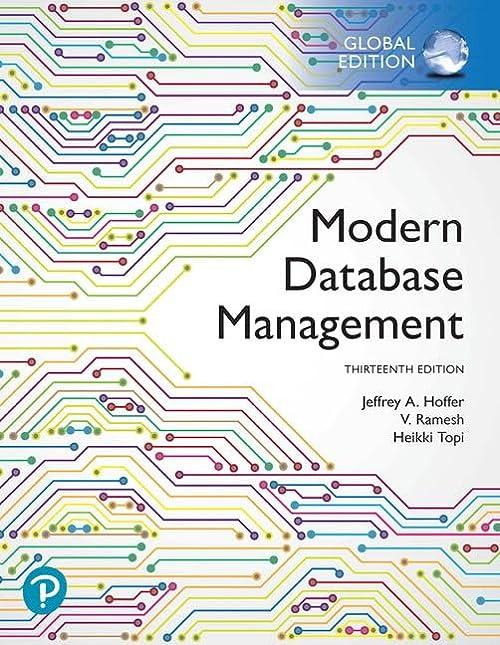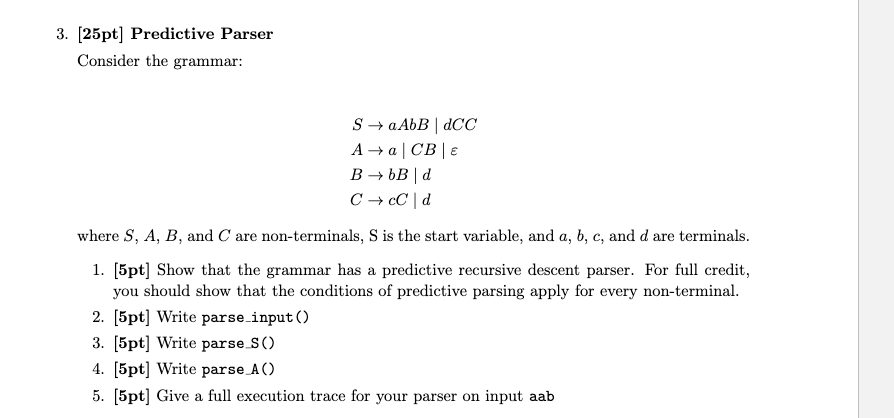
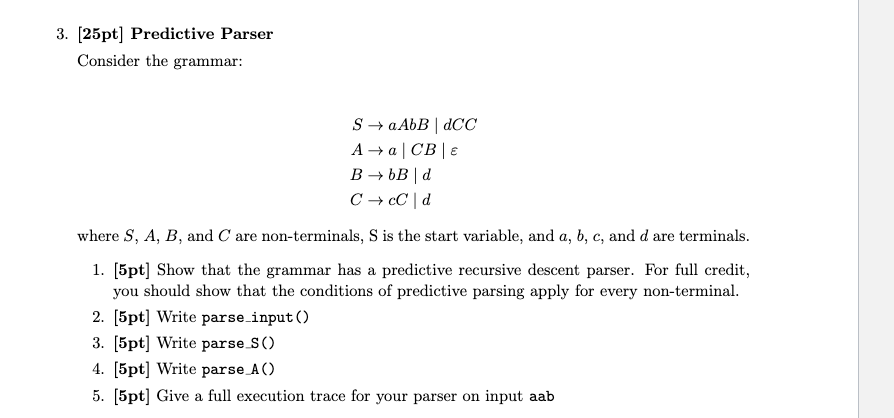
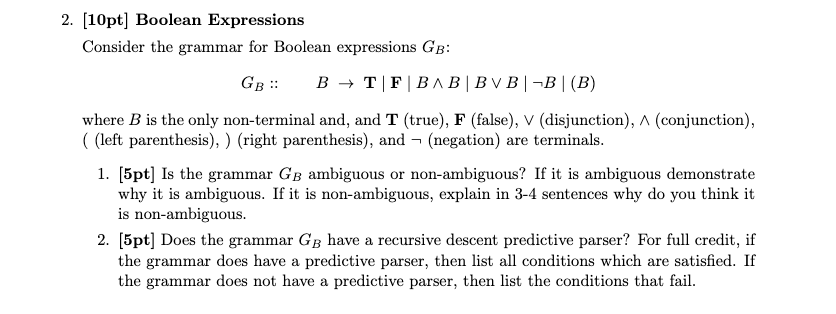
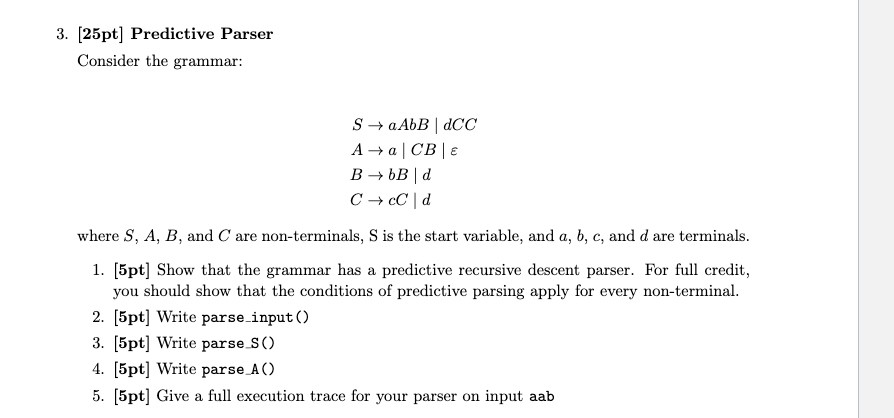
3. [25pt] Predictive Parser Consider the grammar: S + AbB | DCC A a CBE BbBd C+C d where S, A, B, and C are non-terminals, S is the start variable, and a, b, c, and d are terminals. 1. [5pt] Show that the grammar has a predictive recursive descent parser. For full credit, you should show that the conditions of predictive parsing apply for every non-terminal. 2. [5pt] Write parse_input() 3. [5pt] Write parse_S() 4. [5pt] Write parse_A) 5. [5pt] Give a full execution trace for your parser on input aab 3. [25pt] Predictive Parser Consider the grammar: S + AbB | DCC A a CBE BbBd C+C d where S, A, B, and C are non-terminals, S is the start variable, and a, b, c, and d are terminals. 1. [5pt] Show that the grammar has a predictive recursive descent parser. For full credit, you should show that the conditions of predictive parsing apply for every non-terminal. 2. [5pt] Write parse_input() 3. [5pt] Write parse_S() 4. [5pt] Write parse_A) 5. [5pt] Give a full execution trace for your parser on input aab 2. (10pt] Boolean Expressions Consider the grammar for Boolean expressions GB: GB B + T|F|BABBVB-B (B) where B is the only non-terminal and, and T (true), F (false), V (disjunction), 1 (conjunction), ((left parenthesis), ) (right parenthesis), and - (negation) are terminals. 1. [5pt] Is the grammar GB ambiguous or non-ambiguous? If it is ambiguous demonstrate why it is ambiguous. If it is non-ambiguous, explain in 3-4 sentences why do you think it is non-ambiguous. 2. [5pt] Does the grammar GB have a recursive descent predictive parser? For full credit, if the grammar does have a predictive parser, then list all conditions which are satisfied. If the grammar does not have a predictive parser, then list the conditions that fail. 3. [25pt] Predictive Parser Consider the grammar: S + AbB | DCC A a CBE BbBd C+C d where S, A, B, and C are non-terminals, S is the start variable, and a, b, c, and d are terminals. 1. [5pt] Show that the grammar has a predictive recursive descent parser. For full credit, you should show that the conditions of predictive parsing apply for every non-terminal. 2. [5pt] Write parse_input() 3. [5pt] Write parse_S() 4. [5pt] Write parse_A) 5. [5pt] Give a full execution trace for your parser on input aab 3. [25pt] Predictive Parser Consider the grammar: S + AbB | DCC A a CBE BbBd C+C d where S, A, B, and C are non-terminals, S is the start variable, and a, b, c, and d are terminals. 1. [5pt] Show that the grammar has a predictive recursive descent parser. For full credit, you should show that the conditions of predictive parsing apply for every non-terminal. 2. [5pt] Write parse_input() 3. [5pt] Write parse_S() 4. [5pt] Write parse_A) 5. [5pt] Give a full execution trace for your parser on input aab 3. [25pt] Predictive Parser Consider the grammar: S + AbB | DCC A a CBE BbBd C+C d where S, A, B, and C are non-terminals, S is the start variable, and a, b, c, and d are terminals. 1. [5pt] Show that the grammar has a predictive recursive descent parser. For full credit, you should show that the conditions of predictive parsing apply for every non-terminal. 2. [5pt] Write parse_input() 3. [5pt] Write parse_S() 4. [5pt] Write parse_A) 5. [5pt] Give a full execution trace for your parser on input aab 2. (10pt] Boolean Expressions Consider the grammar for Boolean expressions GB: GB B + T|F|BABBVB-B (B) where B is the only non-terminal and, and T (true), F (false), V (disjunction), 1 (conjunction), ((left parenthesis), ) (right parenthesis), and - (negation) are terminals. 1. [5pt] Is the grammar GB ambiguous or non-ambiguous? If it is ambiguous demonstrate why it is ambiguous. If it is non-ambiguous, explain in 3-4 sentences why do you think it is non-ambiguous. 2. [5pt] Does the grammar GB have a recursive descent predictive parser? For full credit, if the grammar does have a predictive parser, then list all conditions which are satisfied. If the grammar does not have a predictive parser, then list the conditions that fail. 3. [25pt] Predictive Parser Consider the grammar: S + AbB | DCC A a CBE BbBd C+C d where S, A, B, and C are non-terminals, S is the start variable, and a, b, c, and d are terminals. 1. [5pt] Show that the grammar has a predictive recursive descent parser. For full credit, you should show that the conditions of predictive parsing apply for every non-terminal. 2. [5pt] Write parse_input() 3. [5pt] Write parse_S() 4. [5pt] Write parse_A) 5. [5pt] Give a full execution trace for your parser on input aab










